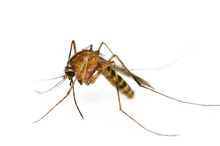The Massachusetts Department of Public Health (DPH) has announced four additional human cases of West Nile virus (WNV) in Massachusetts residents, one of which has resulted in a death, along with the detection of heightened WNV-positive mosquito activity in several areas of the state.

New cases of mosquito-borne disease
The risk level for Amherst has been designated as High and residents are urged to cancel planned evening outdoor events for the remainder of the season until the first hard frost.
On a separate note, health officials have also confirmed the diagnosis of Eastern Equine Encephalitis (EEE) in a horse and completed the case investigation of a Middlesex County resident who died of EEE earlier in August.
Based on the totality of these results, DPH has raised the WNV and EEE threat level designations in every Massachusetts city and town to “Moderate” unless already designated at a higher level, and reminds residents everywhere to continue taking precautions against mosquito bites.
“Taken together, all of these findings point to the fact that the threat of mosquito-borne illness is very real in Massachusetts no matter where you live,” said DPH State Epidemiologist Dr. Al DeMaria. “Keep using insect repellant and avoid outdoor activities at dusk and after nightfall until the first hard frost, when we can be sure that the threat of mosquitoes has passed.”
The risk level for Amherst has been designated as “High”. DPH urges communities designated at “High” risk to cancel any planned evening outdoor events for the remainder of the season until the first hard frost.
People have an important role to play in protecting themselves and their loved ones from illnesses caused by mosquitoes:
Avoid Mosquito Bites
- Apply Insect Repellent when Outdoors. Use a repellent with DEET (N, N-diethyl-m-toluamide), permethrin, picaridin (KBR 3023), oil of lemon eucalyptus [p-methane 3, 8-diol (PMD)] or IR3535 according to the instructions on the product label. DEET products should not be used on infants under two months of age and should be used in concentrations of 30% or less on older children. Oil of lemon eucalyptus should not be used on children under three years of age.
- Be Aware of Peak Mosquito Hours. The hours from dusk to dawn are peak biting times for many mosquitoes. Consider rescheduling outdoor activities that occur during evening or early morning.
- Clothing Can Help Reduce Mosquito Bites. Wearing long-sleeves, long pants and socks when outdoors will help keep mosquitoes away from your skin.
- Mosquito-Proof Your Home
- Drain Standing Water. Mosquitoes lay their eggs in standing water. Limit the number of places around your home for mosquitoes to breed by either draining or discarding items that hold water. Check rain gutters and drains. Empty any unused flowerpots and wading pools, and change water in birdbaths frequently.
- Install or Repair Screens. Keep mosquitoes outside by having tightly-fitting screens on all of your windows and doors.
Protect your horses and other animals
- Animal owners should reduce potential mosquito breeding sites on their property by eliminating standing water from containers such as buckets, tires, and wading pools – especially after heavy rains.
- Water troughs provide excellent mosquito breeding habitats and should be flushed out at least once a week during the summer months to reduce mosquitoes near paddock areas.
- Horse owners should keep horses in indoor stalls at night to reduce their risk of exposure to mosquitoes.
- Owners should also speak with their veterinarian about mosquito repellents approved for use in animals and vaccinations to prevent WNV and EEE.
